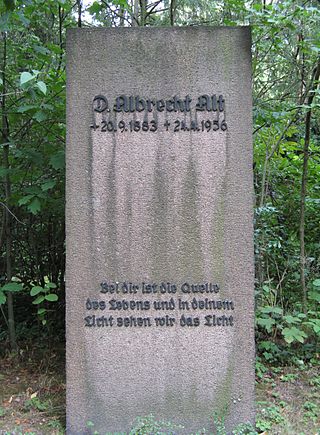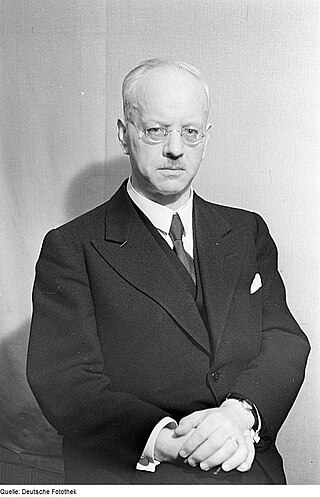
Helmut Franz Maria Kirchmeyer (born 30 June 1930) is a German musicologist, philologist and historian.

Helmut Franz Maria Kirchmeyer (born 30 June 1930) is a German musicologist, philologist and historian.
Kirchmeyer was born in Düsseldorf. After grammar school, he studied musicology, German literature and philosophy at the University of Cologne, where he presented what is probably the first thesis in Germany on a living composer, Igor Stravinsky, in 1954. [1] He then studied legal affairs, concentrating on medieval law and legal history, criminology and sociology in Cologne and church history at the University of Bonn.
Starting in 1947 he attended classes at the Robert-Schumann-Institut in Düsseldorf (whose director he became in 1972), Franzpeter Goebels (piano) and Jürg Baur (composition) were among his teachers, later Bernd Alois Zimmermann introduced him to instrumentation.
In 1982 he qualified as a university lecturer on musicology and musicological media studies at the University of Düsseldorf, he taught musicological bibliography and history at the Institut für Fachbibliographie in Cologne, and musicology at RWTH Aachen University, at the Rheinische Musikschule in Cologne, at the university and at the Robert Schumann Hochschule in Düsseldorf, at the latter he founded the first musicological institute at a German college of music, whose first head he became.
For years he worked as a critic; he worked for GEMA, edited the Instrumentenbau-Zeitschrift, developed programmes for the Westdeutscher Rundfunk. He founded the Düsseldorf College of Music. In 1962 he initiated and developed the record label and series on classic and contemporary German music WERGO, together with German art historian Werner Goldschmidt (1903–1975), [2] [3] hence the name: Wer[ner] Go[ldschmidt]. He also founded Ars Gregoriana, containing the largest documentation of Gregorian chant (more than 500 pieces on 33 LP/CD).
He supported contemporary music and was in touch with many contemporary composers. Herbert Eimert, the founder of the first electronic studio who died in 1972, bequeathed his letters (about 400) to him. [4] [5]
During his time at the Robert Schumann Hochschule, the Partika-Saal for orchestra rehearsals and chamber concerts was built there, which was awarded the title "exemplary artistic building". The crypt below it was decorated by Emil Schult, and Karlheinz Stockhausen composed the piece 50 Klangbilder as musical illustration of Schult's work. [6]

Kirchmeyer married Eva Maria Berke in 1966. They have four children and five grandchildren. In 2020, Kirchmeyer and his wife established the Kirchmeyer Family Foundation that consists of a collection of non-European instruments, about 200 exhibits from Africa, Asia and Australia, that was put together by the Kirchmeyer family over the course of several decades and is now on display at the Ausbildungskorps der Bundeswehr [7] in Hilden.
Kirchmeyer has received the following medals and awards:
In 1992 Kirchmeyer was appointed Corresponding Member of the Saxonian Academy of Sciences in Leipzig, Germany. [11]
Kirchmeyer's studies are strongly influenced by bibliographical, legal and philological approaches, and by the thoughts of music ethnographer Marius Schneider , Kant and Jaspers.
For the first time in German musicology, Kirchmeyer used newspapers and journals as sources for establishing what he calls "Situationsgeschichte", a mosaic picture of the past by combining contemporary evaluations of minute events with almost criminological assessment of their relative reliability. The thus established historical picture enables understanding of musical history as a sequence of minute historical-cultural situations and protects historical events as well as pieces of art from distorting (polemic or apologetic) approaches.
Kirchmeyer's books on Stravinsky (1958) and Wagner (1972) were highly successful. In the former he connected monographical and biographical elements to form a new type of "ergography", which in 2002 he systematically followed up in his bibliography of the works of Stravinsky. Since its publication, Kirchmeyer has been working on his documentary on Wagner criticism again and he has begun to write his memoirs.

Johann Gottfried Flügel was a German lexicographer.
Herbert Eimert was a German music theorist, musicologist, journalist, music critic, editor, radio producer, and composer.
Die Reihe was a German-language music academic journal, edited by Herbert Eimert and Karlheinz Stockhausen and published by Universal Edition (Vienna) between 1955 and 1962. An English edition was published, under the original German title, between 1957 and 1968 by the Theodore Presser Company in association with Universal Edition (London). A related book series titled "Bücher der Reihe" was begun, but only one title ever appeared in it, Herbert Eimert's Grundlagen der musikalischen Reihentechnik.

Albrecht Alt, was a leading German Protestant theologian.
August Conrady was a German sinologist and linguist. From 1897 he was professor at the University of Leipzig.
Ovinius Gallicanus was a senator of the Roman Empire, probably the first Christian Roman consul.

Johannes Stroux was a German classicist, scholar of Roman law and organizer of scientific projects and organizations. In 1945 he became rector of the Berlin University and president of the Berlin Academy of Science.
Peter Ludwig Gülke is a German conductor and musicologist.
Klaus Wolfgang Niemöller was a German musicologist.
Ulrich Aloysius Konrad is a German musicologist and professor at the Institute for Music Research of the University of Würzburg. He is considered an expert on European music of the 17th to 20th centuries, especially the works of Mozart, Robert Schumann, Richard Wagner and Richard Strauss. He wrote a biography, Wolfgang Amadé Mozart, and studied the composer's sketches.
Wolfgang Auhagen is a German musicologist.
Hans Ludwig Kurt Reinhold Grüß was a German musicologist and ensemble leader.
Winfried Schrammek was a German musicologist and organist.
Ute Jung-Kaiser, néeJung is a German musicologist.
Hugo Philipp Balzer was a German conductor.
Annegret Rosenmüller is a German musicologist.

Siegmund Helms is a German musicologist and music educator.
Rudolf Kötzschke was a German historian who founded the Seminar for Regional History and Settlement Studies in Leipzig, the first regional history institution at a German university.
Hans Wilhelm Wildermann was a German stage designer, painter and sculptor.
Wolfgang Pfeifer was a German scholar and linguist.
{{cite book}}: CS1 maint: multiple names: authors list (link){{cite journal}}: Missing or empty |title= (help)